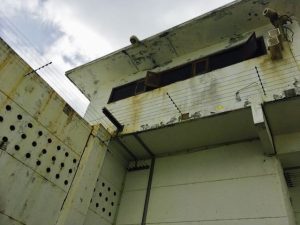PHILIPSBURG – “The situation is bad. Truly dramatic. There’s no rehabilitation at all. Human rights are violated on a daily basis here.” Those are the words of criminal lawyer Shaira Bommel, who works on Sint Maarten, about the prison system on the island.
The Kingdom is already under supervision of the Committee of Ministers of the Council of Europe, because the circumstances under which inmates are detained in police station cells don’t meet the standards set out by the European Court of Human Rights (ECHR). The Court doesn’t elaborate on what is or isn’t a ‘country affair’ and as such the Hague and Sint Maarten have to come up with a plan.
While minister Stef Blok of Foreign Affairs says that he thinks that the supervision will be lifted by the end of the year, Bommel is less optimistic. “I haven’t noticed any improvements.”
Blind alley
Bommel has been working as a lawyer on Sint Maarten since 2008. She is currently defending two individuals who have received life sentences, including Aston Lake, who has already been incarcerated for 35 years. “He has become part of the furniture so to speak. Part of his sentence was a re-socialization plan but that was never implemented. At this point, Lake is seen as a model inmate.”
But there is no reward system for someone who behaves well. In 2015 the minister of Justice decided to get rid of electronic monitoring. “It’s a blind alley.”
The lawyer visits Pointe Blanche nearly every day. The total number of inmates has been capped at 70 at the moment and as such prisoners have to be released regularly. “When a prisoner gets released, tensions go up: why does he get released and I don’t?”, says Bommel. Youth delinquents automatically get sent home.
 Caribbean Network visited the prison in February 2017. Picture: Natasja Gibbs Pointe Blanche has been unsuitable for yearsAfter hurricane Irma, nearly half of the cells in the prison were deemed unsuitable for use. Since then, dozens of prisoners have been transferred to the Netherlands which costs Sint Maarten 120.000 euros per month. In April, sixteen container cells were transported from Bonaire to Sint Maarten but they are still not in use because they have not been hurricane proofed yet. But even before the hurricane it was unsafe in the prison. Caribbean Network visited the prison at the start of 2017, eight months before Irma. |
Bommel also has clients who haven’t received a life sentence and still spend 23 hours a day in a dilapidated cell. Inmates cannot work, there’s little to no education options or a chance to follow a course.
“The recidivism rate is high. Last week I was on-call and from the fourteen arrests, only two are still incarcerated. The rest were sent home due to a lack of cells. This creates a danger to society.”
Well-known alarm
It sounds like Bommel is sounding the alarm, but the deplorable state of the prison has been on the radar for years. “It’s gotten more attention after hurricane Irma, like the issues were caused by the hurricane.”
It’s not that long ago that renewed international interests were shown towards Phillipsburg. Casino owner Francesco Corallo was locked up for six months in a 16 square meter cell with five other inmates. There was also a leaky toilet in the cell and he was allowed outside for only one hour per day.
The European Court decided that the Kingdom – not Sint Maarten – had to compensate Corallo.
Police station cells ‘refurbished’
The police station cells where Corallo was locked up were still being used this year: three undocumented Cuban immigrants were locked up in these cells for 40 days starting in April. According to the government of Sint Maarten the police station cells were refurbished with funds made available through the World Bank. The lighting was upgraded and privacy concerns were addressed.
Minister of Justice De Weever from Sint Maarten says that he is in talks with the United Nations Office for Project Services (UNOPS) to create a plan for renovating the prison.
‘That there isn’t an opportunity for re-socialization or psychiatric help is a violation of human rights’
-Criminal lawyer Shaira Bommel
The question remains: who is responsible? Sint Maarten, the Netherlands, or the Kingdom? “I understand that issues such as a deplorable police station cell are a country issue, but that there isn’t an opportunity for re-socialization or psychiatric help is a violation of human rights. In my view, that is the responsibility of the Kingdom”, says Bommel.
Even though the criminal law bundle of Sint Maarten has allowed detention under hospital orders (tbs) since 2010, it has never been implemented.
TBS cases, but no possibility for tbs
“Unfortunately there are a few instances of cases in the past years where the Public Prosecutor wanted to request tbs, if they had the legal possibility to do so. A lot of those cases resulted in long prison sentences”, says prosecutor Jeroen Kuipers of the Office of the Public Prosecutor (OM) Sint Maarten.
In September 2018, a team of experts from the Dutch Custodial Institutions Agency delivered a report on what was needed to bring the prison system up to date as requested by the minister of Justice for Sint Maarten.
“The Office of the Public Prosecutor took part in those meetings”, says Kuipers. “From their analysis it became clear that there are opportunities on the island, like a collaboration with the Mental Health Foundation. At this point in time there isn’t a specific treatment for criminals with psychological disorders. The probation service tries to guide them as much as possible. They are however understaffed and are missing the proper staff members to guide these individuals.”
Bommel confirms: “I have two clients who have psychological disorders. They are constantly being arrested and are locked up in the police station. Mental Health Foundation can’t take them in because they only have one closed off cell.”

Minister for Legal Protection Sander Dekker and State Secretary Raymond Knops (l) visited the Point Blanche prison in April. Picture: Tim van Dijk
No more psychiatrists
According to Eileen Healy, the interim director of the Mental Health Foundation (MHF), the staff members of the MHF visit the prison regularly to treat the inmates. “The problem is that there isn’t a forensic institute on Sint Maarten or in the prison. Starting next month, we won’t have any psychiatrists at our disposal. We’ve had two psychiatrist from India working for us for the past nine years, but the government decided that we can only work with BIG-registered individuals. We can’t afford Dutch psychiatrists. How is not having a psychiatrist better for the quality of the healthcare?” Healy asks.
MHF is in constant contact with the prison, the ministers of Justice and Social Affairs, because “possibly dangerous former inmates with psychiatric disorders can’t be accommodated anywhere on Sint Maarten”, says Healy.
Minister of Justice Cornelius Weever wants to tackle the lack of rehabilitation in the Pointe Blanche prison on Sint Maarten by letting the inmates repair the hurricane damaged building.
Whether or not the Committee of Ministers of the Council of Europe will be satisfied at the end of the year, will remain to be seen.



